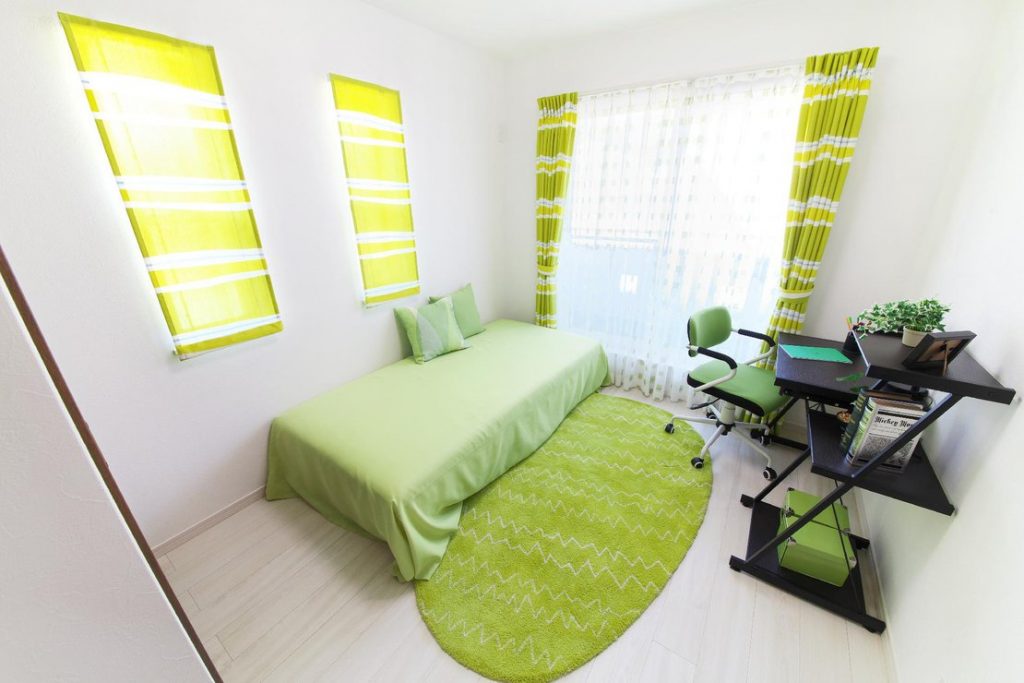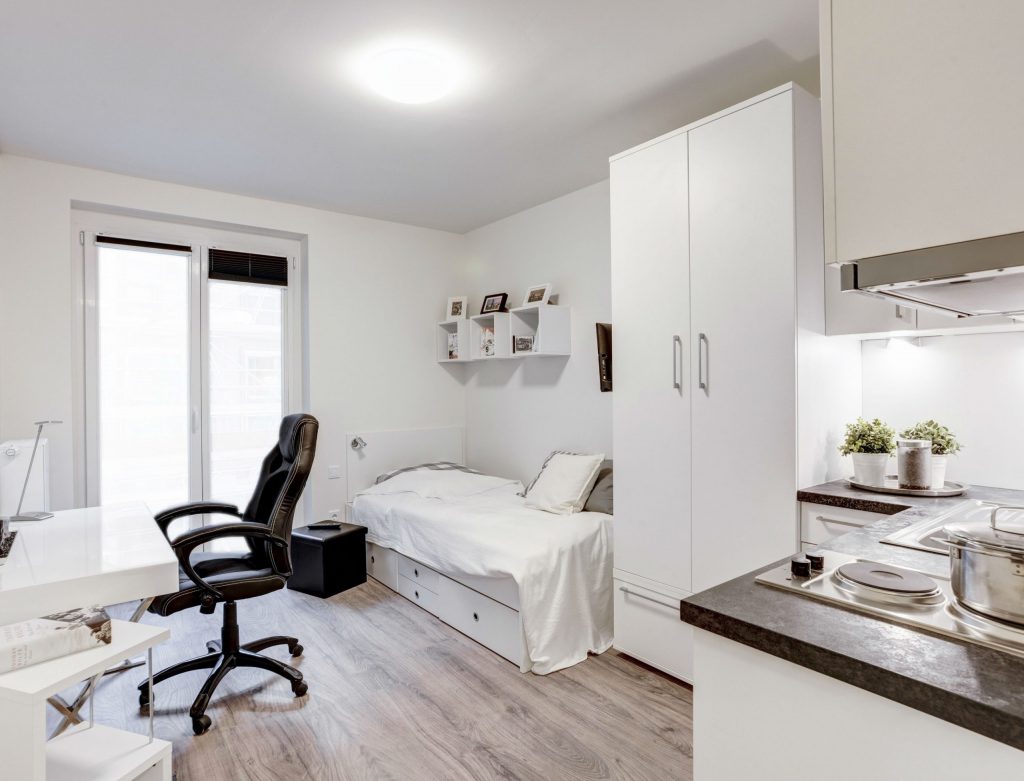Accommodation in Germany
There are two types of housing available to students in Germany. Private housing and halls of residence run by student unions are typically more expensive than the more affordable choice.
Ten percent of students in Germany live in residence halls, according to the Deutsches Studentenwerk. Comparatively, 29% of all German students live in shared apartments, 17% live alone, and 20% live with a spouse.
The same source states that 40% of all international students studying in Germany are residing in resident halls.
This means that 60% of the overseas students are living privately, either alone or with others. The high demand for available spaces in the resident halls, which fill up rapidly, may be the cause of the majority of students living in private residences. However, we won’t talk about other elements that might have also had a part in this.
However, the Deutsches Studentenwerk is aware that there is a significantly higher demand for resident hall spots than there are spots available. They are pleading with the German government to support the construction of new residence halls with roughly 45,000 openings.
How can a student in Germany get accommodation?
For those who have already left Germany, finding a place to stay might be exceedingly difficult. For this reason, the majority of international students studying in Germany wait until they can personally investigate their possibilities for a private housing.
This does not apply to situations where a person is applying for a spot in a residence hall, as this is done totally online and is advised to be done as soon as a person is accepted into studies.

Finding a private accommodation
According to other people’s experiences, although there are many private spaces available for rent, only a small number of them are fully furnished and suitable for habitation. Many flats and rooms are not fit for human habitation and require repairs and upgrades that you might not be aware of.
- There are numerous low-cost private apartments available for students to rent, but they are not furnished with kitchen cabinets, refrigerators, stoves, clothing cabinets, beds or tables, curtains, or any other necessities for living; you must purchase these items with your own money because landlords typically do not provide compensation;
- Fully furnished private residences are extremely hard to come by and far too expensive in comparison to those that aren’t;
- Landlords that have rental properties are typically looking for long-term lease agreements since they prevent tenants from moving out when their circumstances change and they desire a cheaper rent, a shared apartment, etc.
- There are apartments that require renovations that must be completed by the tenant, such as when there is mould, a broken door, or a; this will cost you extra money, time, and energy, and you will typically not be compensated; landlords occasionally include contract clauses that give them the option to increase the rent over time;
- The landlord may take advantage of the fact that most lease agreements are written in German by including clauses that make their terms easy for you to grasp. It is advisable to bring a translator who can walk you through every clause in the contract.

Temporary Accommodation in Germany
International students frequently use temporary housing as a stopgap measure until they acquire a permanent residence in Germany.
Students in Germany have the following alternatives for short-term housing:
- Budget hotels
- Inexpensive hostels
- Youth hostels, however you have to pay a nominal charge to join your country’s chapter of the International Youth Hostel Federation.
- Use “Privatzimmer” (private room) + your area to find persons offering private B&B or private rooms online.
- guest house (pension)
What to do to find temporary accommodation?
- Prior to arriving in Germany, look for and book a temporary choice of lodging so you can stay there while looking for a suitable long-term residence (use the resources provided by internet agents, social media, or write to the international office of the university where you will be studying);
- Don’t forget to plan your transportation from the airport or train station to your temporary residence before you arrive in Germany, and don’t forget to write down the name and address of the place you will need to visit in a letter to bring with you.
- When you arrive in Germany, take some time to stop by the International Office, which can provide you with information about available student-friendly rental properties nearby.
- Make arrangements with the landlords for visits to such apartments to carefully inspect them while you are in Germany and have searched for and located intriguing places to rent; only private accommodations;
- When you arrive in Germany and want to find more affordable housing, you can apply online for a room in the residence halls at the student union “Studierendenwerk” of the city where you will be attending classes.
- Once you have located the desired lodging, schedule some time to go to the neighborhood resident registration office to request registering your address as your primary residence. You can ask the International Office to provide support there by helping you locate the office and providing advice on how to meet the necessary requirements.

Cost of Accommodation
According to DAAD, the majority of students in Germany spend around 900 Euros each month. According to the official figures, in addition to living expenses, international students in Germany tend to spend roughly 298 euros per month on housing. When including living expenses, those who choose less expensive housing options are likely to spend roughly 218 euros over the same time period. However, you should prepare to pay more in rent if you decide to rent an apartment, as many international students do. For instance, a fully furnished apartment with bills might cost between €400 and €800 in Berlin.
Types of Accommodation
It is recognized that the bulk of international students — 60%—live in private residences as only 40% of them are housed in less expensive housing. All current types of affordable housing will be covered in detail.
Cheap accommodation
In Germany, student housing is still most affordable in residence halls. Both domestic and international first-year students are in great demand for this accommodation form.
Student halls of residence
Being able to live in the resident halls has more benefits than just the cheap monthly cost. The desire to reduce their expenses as well as the chance to engage in more social interaction may be the driving forces for international students’ pleasurable requests for this kind of lodging. In comparison to private accommodations, student halls are typically found close to the university campus and promise more social interaction.
Living in a residence hall entails accepting certain regulations and interacting with other residents. A self-administration committee for residents serves as a liaison between the student union and the residents. To help international students assimilate, this administration works with the resident tutors to plan social and sporting & cultural events.
The types of accommodations available in a resident hall vary depending on what the local student union has to offer. There are single rooms, shared apartments, single apartments, couple apartments, single-parent households, and apartments or single rooms in the housing community for disabled people as possible possibilities. Additionally, the living rooms in the residence halls are not all the same size or configuration.
Additionally, there is a deadline for requesting a spot in a hall of residence, and not all students are thought to be equally qualified to apply. Given that there are only so many open spaces, it is encouraged that the application be filed as soon as possible after receiving the letter of acceptance for studies.
Requirements to get a hall of residence
- Submitting the online application through the city’s specific student union website
- Receiving an email containing the applicant’s information and the deadline for submitting the matriculation certificate after submitting the online application on the website of the particular city student union – this indicates the applicant is on the waiting list to receive an offer for a place to stay there.
- submitting the matriculation certificate by the applicant within the deadline
- Receiving an email containing the early notice and a promise that an offer for a place to stay will be issued in the next 4 to 8 weeks
- Receiving an email with the “Festanschreiben” housing offer, the direct debit authorization deadline, the details of the lease agreement, and the contact information for the administrative office in charge of leasing procedures
- Accepting the offer requires responding to the email with a direct debit permission; or rejecting the offer requires by not responding to the email by the due date
Quick accommodation offer “Schnellanschreiben”
- All individuals on the waiting list for available accommodations are simultaneously sent a last-minute notice offer by email when a room in the residence hall becomes available.
- In this situation, the first person to respond with a direct debit authorisation will be given the room.

Private Accommodation
The majority of all international students studying in Germany opt to reside in private housing. Private apartment living offers more privacy, fewer laws and regulations, but regrettably less socialization.
In comparison to other locations in Germany, rent prices are probably higher in cities like Berlin, Munich, Frankfurt am Main, Cologne, and Hamburg.
In order to find a private location, you must search independently. However, you can ask the international office or the local student union for assistance with your search.
You should look for listings for available student residences in local, city, or student media and periodicals if you plan to do your own search.
Apartments for rent are typically advertised in local publications on Wednesday and Saturday. The university also maintains a location on campus where they put these adverts, as well as a place where students can post notifications about wishing to share an apartment with others. Posting your ad for needing an apartment on various portals and in social media groups of the city where you are attending school, particularly Facebook, is an alternative method.
When conducting your search, it is advisable to include the terms Studenten-WG and Studentenwohnung. Make sure your search is tailored to the city where you are attending school.
In order to avoid confusion while searching for a private apartment or room to rent, you must grasp the abbreviations used in media advertisements: where: 2-Zi. -Whg – for a two-room apartment, 2 ZKDB – for a two-room apartment with a hall, bathroom, and kitchen, KT – for a deposit, + NK – a cost for water, garbage disposal, an elevator, housekeeping, and maybe heating, gas, and electricity costs, Smoking is not permitted, and a valid income support certificate is required (NR).
Typically, when renting a place, you must pay a security deposit equal to three months’ worth of the base rent up front to assure the landlord that you won’t be leaving the property anytime soon.
If the tenant does not damage the unit or furniture, the landlord will reimburse the security deposit. The monthly rent is divided into two parts: “Kaltmiete,” which is the basic rent without other fees, and “Warmmiete,” which is the monthly rent with all expenditures included (or the final rent price).

Types of Private Accommodation
Apartment for a single person
This is the time when you decide to rent the full residence privately. There is a greater likelihood that you will spend a lot of money on housing if you are responsible for paying rent and utilities on your own. Additionally, this suggests more quietness and privacy. There is less opportunity to communicate with local students and other international students when living alone in a foreign place.
Flatshare “Wohngemeinschaf”
About 30% of the international students in Germany use this kind of housing, making it a fairly common one.
When living in a flatshare, the student must split the rent, utilities, and other expenses. People staying in this sort of housing are required to share the living room, balcony, kitchen, and bathroom. However, since each of them often has a separate bedroom, there is a place for privacy.
